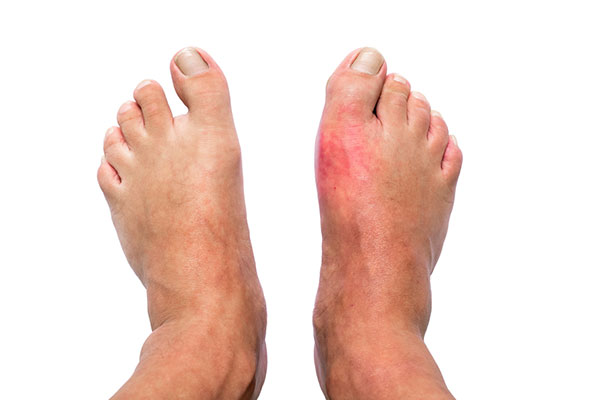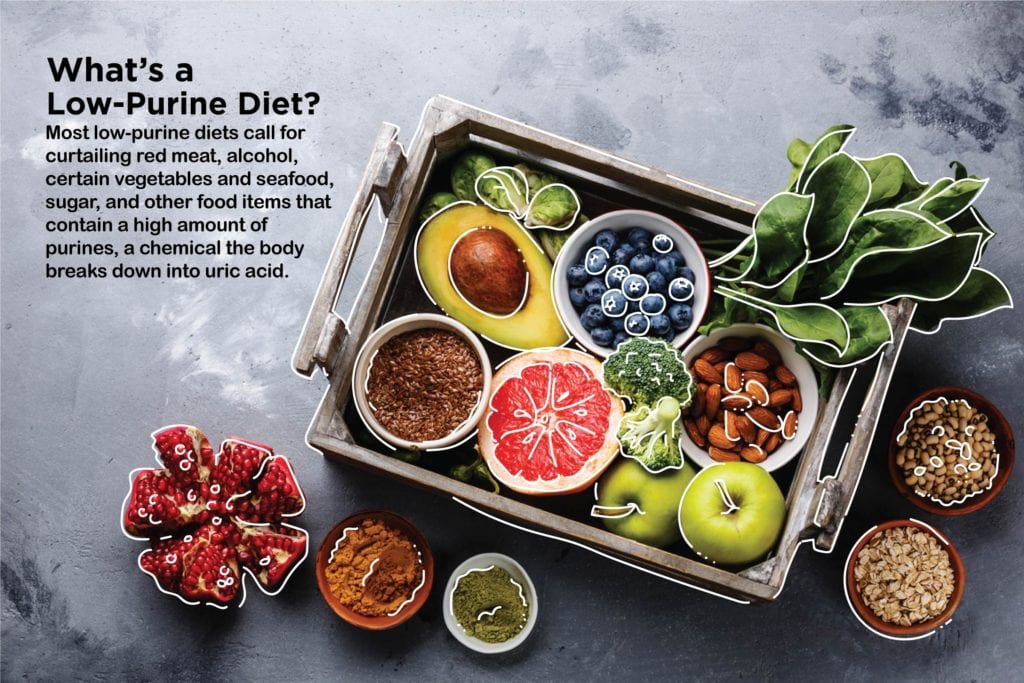To get rid of gout pain fast, you can take nonsteroidal anti-inflammatory drugs (NSAIDs) like ibuprofen or naproxen. Additionally, you can use colchicine to reduce swelling and pain in the affected joint.
These medications can help alleviate gout pain quickly and effectively, providing relief from the discomfort associated with this condition. Gout is a form of arthritis characterized by sudden, severe attacks of pain, swelling, redness, and tenderness in the joints, most commonly in the big toe.
It occurs due to the buildup of uric acid crystals in the joint, leading to inflammation and intense pain. While gout pain can be debilitating, there are various strategies to manage and alleviate the discomfort. We’ll explore effective ways to address gout pain quickly, allowing you to find relief and resume normal activities.

Credit: privatelondonrheumatologist.com
Understanding Gout Pain
Gout is a type of arthritis that causes sudden and severe pain, often starting in the big toe. It occurs due to the buildup of uric acid crystals in the joints, leading to inflammation and intense discomfort. Understanding the causes and symptoms of gout pain is crucial in finding effective ways to alleviate it.
Causes Of Gout Pain
Gout pain is primarily caused by an excess of uric acid in the blood, a condition known as hyperuricemia. This occurs when the body produces too much uric acid or fails to eliminate it efficiently. There are several factors that can contribute to the development of hyperuricemia:
- Diet: Consuming foods high in purines, such as organ meats, shellfish, and certain alcoholic beverages, can increase uric acid levels.
- Obesity: Excess body weight puts strain on the joints and can increase the production of uric acid.
- Genetics: Some individuals may have a genetic predisposition to gout, making them more susceptible to developing the condition.
- Medical conditions: Conditions like kidney disease, diabetes, and hypertension can increase the risk of developing gout.
- Medications: Certain medications, such as diuretics and aspirin, can disrupt the body’s ability to eliminate uric acid, leading to its accumulation.
Symptoms Of Gout Pain
Gout pain is often characterized by its sudden onset and severity. The symptoms typically include:
- Intense joint pain: The affected joint, most commonly the big toe, becomes swollen, red, and tender. The pain is often described as throbbing.
- Inflammation: The joint may exhibit signs of inflammation, such as warmth, stiffness, and limited mobility.
- Recurrent attacks: Gout pain usually occurs in episodes or attacks that can last for several days or even weeks. After the initial attack, there may be periods of remission before another flare-up.
- Tophi: In more advanced cases of gout, white or yellowish nodules, known as tophi, may develop under the skin around the affected joint.
Gout pain can significantly impact a person’s quality of life, making it essential to address the condition promptly. By understanding the causes and recognizing the symptoms of gout, individuals can take proactive steps to manage the pain and prevent future flare-ups.
Credit: www.pharmacyplanet.com
Fast Relief Methods
Discover effective methods to alleviate gout pain quickly. Implementing targeted remedies can provide fast relief from discomfort. Try these proven strategies to combat gout pain swiftly and enhance your overall well-being.
Fast Relief Methods Dealing with gout pain can be excruciating, but there are ways to find fast relief. Whether it’s through medication or home remedies, getting rid of gout pain quickly can help alleviate discomfort and improve your overall well-being.Medication Options
When the pain of gout flares up, medications can provide quick relief. Nonsteroidal anti-inflammatory drugs (NSAIDs) such as ibuprofen and naproxen can help reduce inflammation and pain. Colchicine is another medication that can provide rapid relief by interrupting the inflammation process. Corticosteroids may be prescribed for severe gout attacks to swiftly reduce swelling and pain. It’s important to consult a healthcare professional for the appropriate medication and dosage.Home Remedies
In addition to medication, there are several home remedies that can bring fast relief from gout pain. Applying ice packs to the affected joint can reduce swelling and numb the area, providing immediate relief. Elevating the affected joint and resting it can also help alleviate pain. Drinking plenty of water can help to flush out excess uric acid, a key contributor to gout. Cherries and cherry juice may have anti-inflammatory properties that can help reduce gout pain. Incorporating these home remedies into your routine can offer speedy relief from gout discomfort.Preventive Measures
Gout is a form of arthritis characterized by sudden and severe pain, redness, and tenderness in the joints. While treating acute gout attacks is important, preventive measures are equally crucial to manage the condition effectively in the long term. Implementing dietary changes and lifestyle adjustments can significantly reduce the frequency and severity of gout flare-ups, ultimately leading to better control of the condition.
Dietary Changes
Adjusting your diet plays a crucial role in managing gout. Certain foods high in purines, such as organ meats, seafood, and alcohol, can trigger gout attacks. Incorporating more low-purine foods like fruits, vegetables, whole grains, and lean meats can help control uric acid levels. Additionally, staying well-hydrated by drinking plenty of water can help flush out excess uric acid from the body, reducing the risk of gout flare-ups.
Lifestyle Adjustments
Adopting healthy lifestyle habits can contribute to gout prevention. Maintaining a healthy weight through regular exercise and a balanced diet can lower the risk of gout. Limiting alcohol consumption and avoiding sugary beverages can also assist in reducing the frequency of gout attacks. Furthermore, managing stress through relaxation techniques and sufficient sleep can help lower the risk of gout flare-ups.
When To Seek Medical Help
If you want to know when to seek medical help for fast relief from gout pain, it’s important to consult a healthcare professional for proper diagnosis and treatment options. Seek medical assistance as soon as possible to alleviate the pain and prevent further complications.
Gout pain can be excruciating, and finding relief is crucial. While there are various remedies you can try at home, it’s essential to know when to seek medical help. If you experience signs of severe gout or find that your usual remedies aren’t providing relief, it may be time to consult a healthcare professional. By understanding the signs of severe gout and knowing when to seek medical attention, you can ensure prompt treatment and find long-lasting relief.Signs Of Severe Gout
When it comes to gout, the pain can range from mild to severe. However, there are certain signs that indicate your gout symptoms may require medical attention. If you experience any of the following, it’s crucial to consult a healthcare professional:- Intense Pain: Unbearable pain in the affected joint that doesn’t subside even with home remedies.
- Inflammation: Swelling, redness, and extreme tenderness in the affected joint.
- Difficulty Walking: Gout pain that hinders your ability to walk or perform daily activities.
- Fever: A high body temperature accompanied by joint pain can be a sign of an infection.
- Recurrent Gout Attacks: Frequent and recurring bouts of gout pain that affect your quality of life.
Consulting A Healthcare Professional
When dealing with severe gout pain, consulting a healthcare professional can provide you with the expert guidance and treatment necessary for immediate relief. Here are some reasons why it’s essential to seek medical help:- Accurate Diagnosis: A healthcare professional can confirm whether your symptoms are indeed gout and rule out other potential causes.
- Personalized Treatment: They can recommend a treatment plan tailored to your specific needs, taking into consideration your medical history, lifestyle, and the severity of your gout symptoms.
- Prescription Medication: For severe or chronic gout, prescription medications may be required to manage pain and prevent future gout attacks.
- Prevention Strategies: A healthcare professional can provide valuable advice on lifestyle changes, dietary adjustments, and other preventive measures to reduce the frequency and severity of gout attacks.
Long-term Management
When it comes to managing gout over the long term, it is essential to create a comprehensive plan that includes monitoring gout flare-ups and implementing strategies to prevent them in the future.
Monitoring Gout Flare-ups
Regularly monitor your gout symptoms to track flare-ups and identify triggers that may worsen the condition.
Keep a gout diary to record your daily activities, diet, and symptom severity to better understand your gout patterns.
Creating A Plan For Gout Management
Consult with a healthcare professional to develop a personalized gout management plan that includes medication, lifestyle changes, and dietary modifications.
Implement a healthy diet rich in fruits, vegetables, whole grains, and lean proteins while avoiding high-purine foods like red meat, organ meats, and alcohol.
Stay hydrated by drinking plenty of water to help flush out uric acid from your body and reduce the risk of gout flare-ups.
Engage in regular physical activity to maintain a healthy weight and improve overall joint health, which can help prevent gout attacks.

Credit: creakyjoints.org
Frequently Asked Questions Of How Do You Get Rid Of Gout Pain Fast
What Is The Fastest Way To Flush Gout?
The fastest way to flush gout is by staying hydrated, eating a balanced diet, limiting alcohol and avoiding high-purine foods. Additionally, taking medication as prescribed by a doctor can help alleviate symptoms. Regular exercise can also aid in preventing gout flare-ups.
What Is The Best Thing To Drink If You Have Gout?
The best thing to drink for gout is water. Staying hydrated helps with uric acid elimination. Avoid sugary drinks and limit alcohol.
What Relieves Gout Pain Immediately?
Immediate relief from gout pain can be achieved with nonsteroidal anti-inflammatory drugs (NSAIDs), such as ibuprofen or naproxen. Other options include corticosteroids or colchicine. Applying ice packs and elevating the affected joint may provide temporary relief as well.
Should I Walk With Gout?
Yes, you can walk with gout but listen to your body. Avoid high-impact activities and opt for gentle exercises.
Conclusion
There are several natural remedies and lifestyle changes that can help relieve gout pain quickly. From maintaining a healthy diet and weight to staying hydrated and incorporating exercise, these simple steps can go a long way in alleviating gout symptoms.
Additionally, using ice packs, elevating the affected joint, and taking over-the-counter pain medications can provide immediate relief. Remember, it’s important to consult with a healthcare professional for personalized advice and treatment options.
